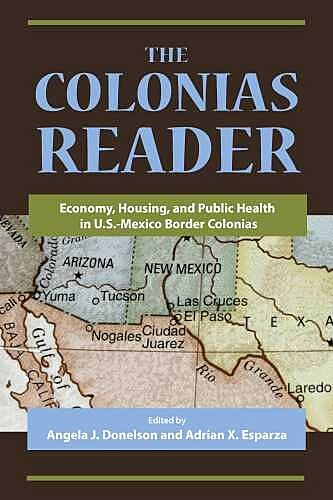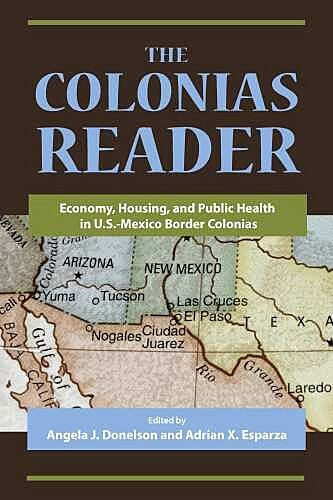The Colonias Reader
Economy, Housing and Public Health in U.S.-Mexico Border Colonias
Edited by Angela J. Donelson and Adrian X. Esparza
The University of Arizona Press
The colonias of the U.S.–Mexico border form a loose network of more than 2,500 settlements, ranging in size from villages to cities, that are home to over a million people. While varying in size, all share common features: wrenching poverty, substandard housing, and public health issues approaching crisis levels. This book brings together scholars, professionals, and activists from a wide range of disciplines to examine the pressing issues of economic development, housing and community development, and public and environmental health in colonias of the four U.S.–Mexico border states.
The Colonias Reader is the first book to present such a broad overview of these communities, offering a glimpse into life in the colonias and the circumstances that allow them to continue to exist—and even grow—in persistent poverty. The contributors document the depth of existing problems in each state and describe how government agencies, nongovernmental organizations, and community activists have mobilized resources to overcome obstacles to progress.
More than reporting problems and documenting programs, the book provides conceptual frameworks that tie poverty to institutional and class-based conflicts, and even challenges the very basis of colonia designations. Most of these contributions move beyond portraying border residents as hapless victims of discrimination and racism, showing instead their devotion to improving their own living conditions through grassroots organizing and community leadership.
These contributions show that, despite varying degrees of success, all colonia residents aspire to a livable wage, safe and decent housing, and basic health care. The Colonias Reader showcases many situations in which these people have organized to fulfill these ambitions and provides new insight into life along the border.
The Colonias Reader is the first book to present such a broad overview of these communities, offering a glimpse into life in the colonias and the circumstances that allow them to continue to exist—and even grow—in persistent poverty. The contributors document the depth of existing problems in each state and describe how government agencies, nongovernmental organizations, and community activists have mobilized resources to overcome obstacles to progress.
More than reporting problems and documenting programs, the book provides conceptual frameworks that tie poverty to institutional and class-based conflicts, and even challenges the very basis of colonia designations. Most of these contributions move beyond portraying border residents as hapless victims of discrimination and racism, showing instead their devotion to improving their own living conditions through grassroots organizing and community leadership.
These contributions show that, despite varying degrees of success, all colonia residents aspire to a livable wage, safe and decent housing, and basic health care. The Colonias Reader showcases many situations in which these people have organized to fulfill these ambitions and provides new insight into life along the border.
Angela J. Donelson is president of Donelson Consulting in Tucson and co-author of Colonias in Arizona and New Mexico: Border Poverty and Community Development Solutions, also published by the University of Arizona Press. Adrian X. Esparza is an associate professor in the School of Natural Resources at the University of Arizona. He is co-author of Colonias in Arizona and New Mexico: Border Poverty and Community Development Solutions, also published by the University of Arizona Press.
Part I Colonia Economies and Economic Development
1 The U.S.–Mexico Border Economy
Oscar J. Martínez
2 Microbusiness in Texas Colonias
Cecilia Giusti
3 Economic Development in New Mexico’s Colonias
Robert Czerniak and David Hohstadt
4 Arizona’s Evolving Colonias Economy
Vera Pavlakovich-Kochi and Adrian X. Esparza
5 Agricultural Prosperity, Rural Poverty, and California’s Colonias
Vinit Mukhija
Part II Housing and Community Development
6 Colonia Housing and Community Development
Lydia Arizmendi, David Arizmendi, and Angela Donelson
7 Housing in Texas Colonias
John Henneberger, Kristin Carlisle, and Karen Paup
8 Sustainable, Affordable Homeownership in Arizona and New Mexico Colonias
Angela Donelson and Esperanza Holguin
9 Faith and Development in the Colonias of New Mexico and Arizona
David S. Henkel Jr.
10 Farmworkers, Housing, and California’s Colonias
John Mealey
Part III Colonias Health and the Environment
11 Living Betwixt and Between: Conditions of Health in Borderland Colonias
Marlynn May
12 Colonias Health Issues in Texas
Sergio Peña and E. Lee Rosenthal
13 Social Justice and Health in Arizona Border Communities: The Community Health Worker Model
Samantha Sabo, Maia Ingram, and Ashley Wennerstrom
14 Urbanization and Environmental Health in Arizona Colonias
Laura Norman
15 Environmental Pollution and Quality of Life in Imperial Valley’s Colonias
Kimberly Collins
Part IV Conclusion: Reflections and Directions
16 A Sustainability Praxis for the Future of Colonias Development and Colonias Studies
William D. Smith
Works Cited
About the Editors
About the Contributors
Index






